The Response - UWA Staff - The University of Western Australia
The Response - UWA Staff - The University of Western Australia
The Response - UWA Staff - The University of Western Australia
You also want an ePaper? Increase the reach of your titles
YUMPU automatically turns print PDFs into web optimized ePapers that Google loves.
in a nutshell, this model merges the online and campus components and develops the online content from a<br />
<strong>UWA</strong> discipline perspective, even in an introductory marketing unit. It maintains good graduate qualities because<br />
students are still expected to attend the workshop and the tutorial; if a student cannot attend the workshop, they<br />
are encouraged to interact with their group members for the answers.’<br />
‘I do think that there are wonderful opportunities to harness new technologies to do what we do best – providing<br />
a stimulating and educational on-campus experience for our students. That is what we need to focus on. Here is<br />
one example. We are experimenting with new first year courses in the engineering faculty involving a much greater<br />
emphasis on face-to-face teaching that we have in the past. Many <strong>of</strong> the students yearn for interesting lectures:<br />
they have not reacted well to the need to read relatively boring material before coming to classes. We are planning<br />
a small experiment in which we will reward students for finding really exciting and short online lecture and video<br />
material. 500 students trawling the Internet for interesting material is likely to be much more effective than one or<br />
two staff members trying to do the same. We will review the best suggestions and make them available to the<br />
other students.’<br />
Proposal 2: That the <strong>University</strong> develop its campus facilities and services (including residential colleges)<br />
with the explicit intention <strong>of</strong> enhancing the learning opportunities <strong>of</strong> students.<br />
‘Are we brave enough to aim for a residential experience for all first-year students?’<br />
‘I believe the <strong>UWA</strong> Residential Colleges can <strong>of</strong>fer more to, and be utilised more by, the university than is<br />
currently the case. Whilst a decline in lecture attendance and the growing use <strong>of</strong> online options is observed, my<br />
observations are that the <strong>of</strong>ferings by colleges such as leadership programs and positions, cultural awareness<br />
programs, community service programs and less formal gatherings <strong>of</strong> residents have never been more popular<br />
amongst college students. Much <strong>of</strong> this popularity is because they see real value in the program, it’s personable<br />
and most view it as adding ‘weight’ to their CV…. My recommendation would be that all first year students<br />
entering the university be assigned a college to which they belong (regardless if they live there or not), with the<br />
option <strong>of</strong> the student taking out an affiliated membership from that year onwards.<br />
To make an affiliated model work I believe that it needs to commence at the start <strong>of</strong> a student’s tertiary education.<br />
<strong>The</strong> connection to the college (and ultimately the university) would then commence at orientation (with some<br />
activities based in colleges for all affiliated 1st years) and then the student would continue to be supported and<br />
involved in various activities (with the colleges, student services and faculties working together) over the course<br />
<strong>of</strong> the year. For example, tutorials, academic dinners and involvement in the social and sporting opportunities<br />
that already exist could be extended to include all students affiliated and not just those in residence. Colleges<br />
are successful because from day one <strong>of</strong> the first year student entering the college, they are led, engaged, shown<br />
genuine interest, communicated with, and shown care for at a personal and most <strong>of</strong>ten face to face level. This can<br />
be done because colleges have both the formal (e.g. tutorial/study rooms) and informal settings (dining halls) to<br />
do so as well as the ‘inbuilt’ social structure. <strong>The</strong>re is no reason (with good coordination) this can’t be extended to<br />
include greater numbers.’<br />
‘Twenty years ago we had a vibrant campus life, but it is ebbing away, and we need to instil in the students a<br />
sense that <strong>University</strong> is about more than formal education. How to do this isn’t an easy question, but my own<br />
thoughts include:<br />
ÌÌ<br />
ÌÌ<br />
ÌÌ<br />
Some form <strong>of</strong> college affiliation (non-residential in many/most cases) for all students, with at least minimal<br />
social obligations.<br />
Encourage a more balanced <strong>of</strong>fering <strong>of</strong> social activities by central student bodies.<br />
At the micro level, revival <strong>of</strong> some <strong>of</strong> the activities that have fallen by the wayside over time. For instance there<br />
used to be weekly lunchtime outdoor concerts in semester and a regular schedule <strong>of</strong> economically priced film<br />
showings in our large lecture theatres.’<br />
08 | www.uwa.edu.au


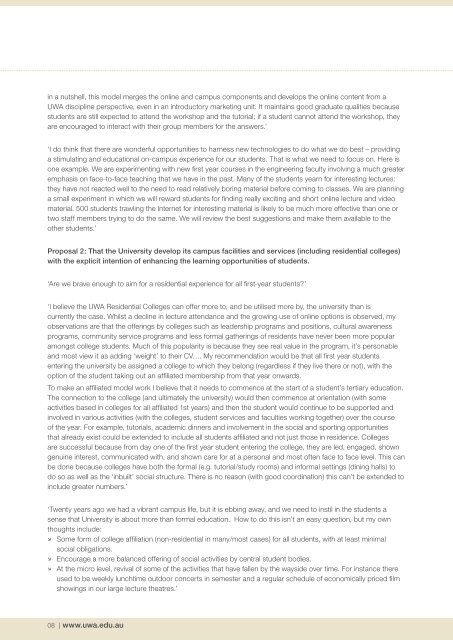
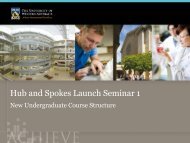

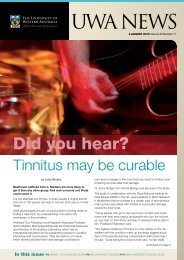
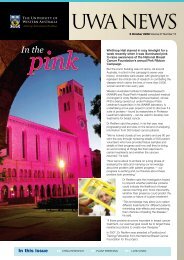
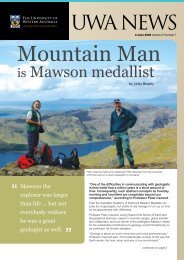




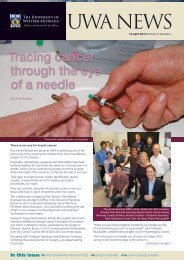
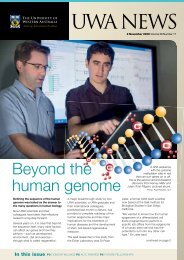
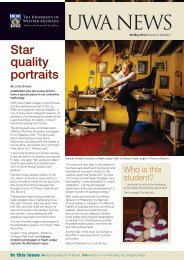
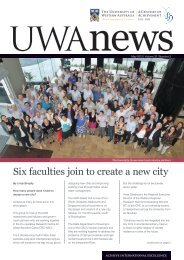
![Issue 13. 6 September 2010.pdf [PDF File, 1.7 MB] - UWA Staff - The ...](https://img.yumpu.com/26619782/1/184x260/issue-13-6-september-2010pdf-pdf-file-17-mb-uwa-staff-the-.jpg?quality=85)